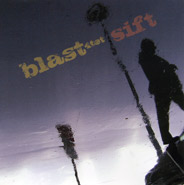Blast 4tet
Sift
(ReR)
It's
weird, in a way, to notice that six long years have already passed since
the release of Altrastrata, Blast's last album before Sift. I can only
formulate conjectures about the reason(s) why, Sift's liner notes revealing
only that the album was recorded Summer 2006, mixed Autumn 2007.
A
look at the credits confirms to me that the quartet line-up is the same:
Dirk Bruinsma on baritone and soprano saxophones; Frank Crijns on electric
guitar; Paed Conca on electric bass; Fabrizio Spera on drums. I notice
that while the album was recorded (again) by Stefano Vivaldi, this time
the mix is by Sandor Caron - not Bob Drake - and the group.
The
circumstance of Sift being so different from its predecessor (we could
maybe define it as being incommensurable) revealed to be a formidable obstacle
for this writer: Altrastrata had shown an enormous change in Blast's M.O.,
for reasons I explained at length at the time of my review of that album.
Here I'll just say that Bob Drake's work had made it possible for the group
to escape those dangerous places in the realms of both composition and
performance that, however illustrious (we're talking about the Rock In
Opposition brand, no less), were about to turn into sterile mannerisms.
Readers are invited to ask themselves this question: what comes after the
group's decision to abandon Drake's "artificial" approach in
favour of the old and trusted
"photographic" approach in the recording studio - provided the
group's compositional language stays basically the same?
It
goes without saying that what precedes is this writer's opinion; of course,
those who considered Altrastrata as a momentary aberration will have a
very different opinion. After a week of listening sessions, I think I can
safely say that the more I listened to Sift alongside Altrastrata the more
the new album sounded as
"lacking", my opinion being different - but not terribly different
- after I had listened to the new album as an "autonomous" entity.
The
main thing is that to me Sift appears as lacking the sonic clarity that's
so necessary for a music so rich in counterpoint as the music played by
Blast. A clarity that was also so important for the most "normal-sounding"
moments of Altrastrata (say, the last three tracks on the album). Spera is
maybe the most penalized here, but the same could be said for the album's
knottiest moments. Let's turn up the volume, and start listening.
The
group's decision of having Sift as the opening track had me long puzzled:
composed by Bruinsma, it's the most complex here, and in my opinion also
the one that suffers the most due to a muddy mix and a few "brutal"
edits. I would had seen it as a perfect track 4, before Spera's
"unorthodox" contribution. However, I have to admit that in the
end I came to the conclusion that the group was right: aesthetically, it
was the right decision; while commercially, it won't make any difference.
Sounding
intricate and poly-thematic, Sift reminded me of some compositions Tim
Hodgkinson wrote for Henry Cow, especially Living In The Heart Of The Beast,
Spera's drum parts here sounding quite a bit Cutler-like. There's a nice
development after the transition that occurs at 3' 36", a bit too
dark-sounding for me. The change in ambience after 7' 20" sounded
a bit too disconcerting for me, then it's the Hodgkinson climate again.
Penned
by Conca, the brief Cklack sports a surprisingly funky attack, clarinet,
bass/soprano unisons, and a moment à la Henry Cow/Unrest starting from
1' 12", the snare drum played brushes, and a fine "accelerando" at
3' 08". Sounds fine.
After
a slow cadenza strategically placed at the start, the long composition
penned by Crijns, Fluke, has a groove (at 46") and a riff (at 59")
that really reminded me of Frith-era Material, circa Memory Serves. Spera
has a fine moment starting at 3' 26", his frenetic snare with brushes
in the foreground, while bass and baritone sax play underneath (definitely
one of those moments where a bit more clarity would help). I couldn't help
but notice the two chords, played "staccato", at 9' 29" and
at 9' 30": it really sounds like the end to Lament by King Crimson,
before that instrumental coda in odd time; instead, here we have the "Material" theme.
Swerves,
by Bruinsma, is a nice "different moment": a svelte theme, a
fine soprano, a good Spera in the general direction of "Great Black
Music", with maybe a tip of the hat to Don Moye.
I asked myself: Does the fact of considering the album closing track, Pole,
as the album's best, imply by necessity a value judgment about the whole
album, Pole being so different in terms of inspirational sources and number
of notes per minute? It's a question I'll leave to readers!
Though
it has a long, frenetic moment for soprano sax, those silences and
"mysterious sounds" that inhabit Pole reminded me a lot of Ossatura,
the other line-up of which Spera is a permanent member. Here the "cicadas
at night" that appear here and there, and those "Zappa-like" moments
- listen to the fade-up from 13" to 20", and the complex sonic
picture starting at 2' 32" - are a dead giveaway of the presence of
fellow Ossatura Elio Martusciello, who guests on this track.
Beppe Colli
© Beppe Colli 2009
CloudsandClocks.net | Aug. 27, 2009











